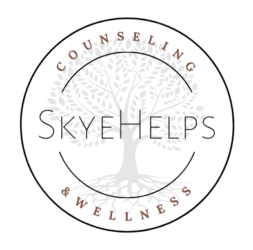Heal from the past.
Request Counseling Appointment

SkyeHelps offers in-person and online counseling for individuals suffering from PTSD or other types of trauma.
What is trauma?
Trauma is complex. It is personal. It is treatable.
Post Traumatic Stress Disorder, also known as PTSD, can result from many kinds of experiences, ranging from abuse to divorce to the horrors of war. Each case is different, and each person responds uniquely, depending on their background and previous experiences. Nevertheless, it is possible to help people learn to manage their trauma response.
Most people are likely to experience some type of trauma. There are many different types of trauma: car accidents, medical emergencies, natural disasters, abuse, assault, robbery, never feeling safe as a child, being told you are stupid, being abandoned, or witnessing someone being hurt. The list of trauma origins is infinite.
There are physical and emotional symptoms that can develop after experiencing trauma. That list is as long as the trauma origins. The DSM-V, the manual that defines many mental disorders, defines PTSD fairly narrowly. As clinicians, we understand that trauma is much bigger than the narrow definition in the DSM.
Physical symptoms of trauma:
- Nightmares- Nightmares are a common side-effect of the shock that occurred during the traumatic event. When your body experiences shock, your brain can continue those feelings into your sleeping hours. Your nightmares may not mimic the exact traumatic experience that occurred, but they can have common themes. Nightmares can be harmful to your body, because it can cause sleep deprivation. They can also be dangerous to those around you if the nightmares include aggressive physical responses.
- Flashbacks- Flashbacks, also known as involuntary recurrent memory, are sudden vivid memories where you are re-experiencing a traumatic event. The event can be signaled by something in your daily lifestyle.
Emotional symptoms of trauma:
- Anxiety – Anxiety is one of the most common emotions to feel after a traumatic event. The anxiety can come from the fear you felt during an event. This is a very natural and normal emotion to have after a traumatic event. The fearful emotion that developed during the tragedy can carry on into your daily lifestyle, causing anxiety to take over your emotions.
- Anger – Anger is also a very common emotion to feel after a tragedy. The anger you may feel after a tragedy can be towards to the person or situation that caused the traumatic event. You may feel angry towards family, society, or even God.
- Depression– You may feel sad or numb after a traumatic event. It is natural to feel overwhelmed by all the emotions you felt during the tragedy, so this may cause you to shut down your emotions instead of feeling so many.
You are not alone. These physical and emotional symptoms you feel after a tragedy are very natural. Each person may have a unique emotional experience. The clinicians at SkyeHelps are here to help you learn to manage and heal from the traumatic events.
Post Traumatic Stress Disorder (PTSD)
PTSD is a disorder in which a person has difficulty recovering after experiencing or witnessing a traumatic event, and it affects everyone differently. Anyone can develop PTSD at any age. You are not broken if you are experiencing PTSD. Our team of trained trauma therapists can help you begin healing by teaching you therapeutic methods that will help you manage the emotions you may be feeling.
PTSD can develop from any type of traumatic event and can include any of the symptoms listed above. There are two different types of PTSD that one may develop: Chronic (prolonged) and Acute (short-term). There is also new emerging data that suggests a third category of trauma is warranted. Dr Van der Kolk has created diagnostic criteria for Developmental Trauma Disorder for children with complex trauma histories.
Our Clinical Mental Health Counselors can teach you to manage the aftermath of emotional trauma and post-traumatic stress. The skills we share with you go beyond simple coping strategies to behavior and thought modification in order to help you find peace. Learn to live without fear, without looking over your shoulder, without sitting in the corner seat at the restaurant. Peace after trauma is possible.
Make an Appointment:
Click here to request an appointment or call 706-864-5674. When the time comes, you will be able to choose between sessions in the office or online, whichever you prefer.

